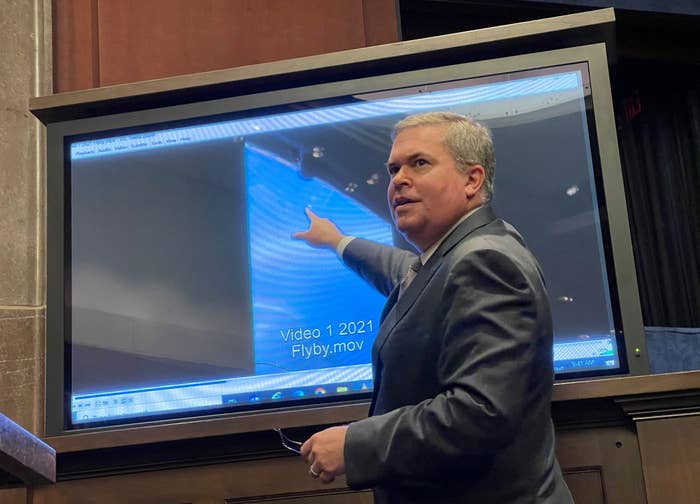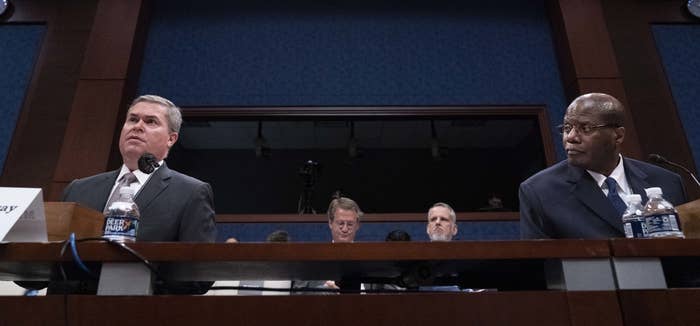
Two military officials released a new “unidentified aerial phenomena” video on Tuesday at a congressional hearing on UFOs, where they said they now had 400 reports of such sightings. And they did their damndest to not talk about aliens.
The House Permanent Select Committee on Intelligence public hearing was the first one on UFOs since 1968 and was followed by a closed session, where technical details of sightings could be discussed without breaking military secrecy rules.
“Unidentified aerial phenomena are a potential national security threat, and they need to be treated that way,” said committee chair Rep. André Carson of Indiana, setting the tenor for the hearing as one driven by military concerns about the incidents as potential espionage cases, rather than being about flying saucers or little green aliens.
“For too long, the stigma associated with UAPs has gotten in the way of good intelligence analysis,” Carson said. “Pilots avoided reporting or were laughed at when they did.”
Public interest in the UFO question has crested since 2017, when news reports emerged that the Defense Department had run a program looking into UFO sightings. The hearing was a follow-up to a report released last June by the director of national intelligence that looked at 144 UAP observations made by military pilots from 2004 to 2021. That report found one was a weather balloon and only 18 merited follow-up investigations, while the rest were too vague to pursue. The Defense Department now has some 400 records of such observations, many of them historical accounts, according to hearing testimony.
“We know our service members have encountered unidentified aerial phenomena,” Defense Department intelligence official Ronald Moultrie said at the hearing. “We want to know what is out there as much as you do.”
As of this week, the Pentagon’s new Airborne Object Identification and Management Synchronization Group now has an official picked to run the office investigating the incidents, he added.
The big concern for defense officials is that some UAPs were actually foreign drones spying on military flight maneuvers. They don’t want those incidents going unreported by pilots for fear they will be branded as “kooks,” said naval intelligence official Scott Bray.
“The message is now clear. If you see something, you need to say something,” he added, describing a culture change where the military now encourages pilots to disclose incidents so they can be investigated in a systematic way. Pilots are expected to preserve data and fill out reports on UAPs for that reason.
Part of the hearing spent several minutes going over a video of a fleeting observation of a bright dot in the sky that zipped across the glare of a bright blue sky as seen through the window of a military plane.
“I do not have an explanation for this observation,” said Bray, which he called typical for such incidents. “We have no material. We have detected no emanations within the UAP Task Force that would suggest it's anything nonterrestrial in origin.”

Congress has not held UFO hearings since the late 1960s, when they were devoted to an Air Force–funded report that found visual and radar observations of lights moving over a military base in 1967 were the result of birds and powerful weather conditions that produced mirages. UFO enthusiasts have been arguing about the report, and hearings, ever since.
“These kinds of events live on within the community. And serious UFO researchers will be on the lookout for any hints or references that might lead them to believe that something is being kept from the public or that implies the possibility that these are alien in nature,” Penn State science historian Greg Eghigian told BuzzFeed News. “The fact that there will be a closed session – understandable though that may be – will certainly leave many wondering what has been left out from the public session.”
The hearing testimony did knock down a few popular UFO stories bouncing around in credulous news reports over the last few years. The Defense Department has no wreckage, or materials that look “non-terrestrial” in origin, Bray said. That’s despite a New York Times report in 2017 of materials believed to be “alien alloys” that were stored by the government. The officials said they had no reports of red lights disabling nuclear missiles in a widely reported 2010 incident. (They promised to look into it.) There were no records of collisions with any UAPs, although there had been 11 “near-misses” reported, Bray said. The officials also stated they knew of no Russian or Chinese technology that could explain any objects moving without an apparent means of propulsion.
Notably, said Eghigian, while the officials acknowledged some incidents remain unexplained despite there being considerable information, they considered the difficulty with unraveling them to be a “data issue,” as Moultrie put it, not cases of supernatural or extraterrestrial phenomena.
The military officials stated repeatedly that they trust sensors and instruments, and consider “narrative-based” witness statements to be less reliable, Eghigian noted. “They believe the way forward, the way to make this enterprise more scientifically rigorous, is through creating standardized data.”
Incidents take a good deal of analysis, Moultrie said, because they could be everything from drones to mirages to glitches or something else. A second film of glowing triangles in the sky captured by night vision goggles presented at the hearing, for example, turned out to be an artifact of the type of camera used to capture the video. (An independent video analyst, Mick West, had debunked the glowing triangle video last year for this reason.)
Toward the end of the hearing, Rep. Darin LaHood of Illinois complained of “amateur interest groups” promulgating false claims of UFO incidents for profit.
“What is the deterrent from people putting out misinformation?” he asked.
“I don't have that answer,” Moultrie replied, adding that false reports waste his investigators’ time and undermine public confidence in the Pentagon.
“I welcome a dialogue with Congress to talk about that,” he added. “To help legislate those laws to say what should be the legal ramifications.”
